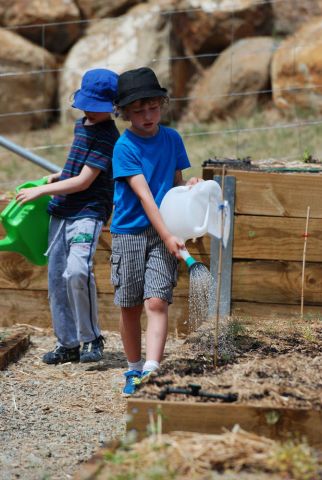 A few good habits developed early in life can set you up for greater success later on.
A few good habits developed early in life can set you up for greater success later on.
Anyone who has ever invested money in a savings account knows the benefit of compound interest. You earn interest on your deposit and then you earn interest on the interest.
What this means is that by making a few small changes that you barely notice and applying them consistently, over time you will see a radical difference.
This compound effect can be applied to anything from health to savings and also productivity.
With a new year lying before us, we have the opportunity to start making some little changes that twelve months from now might mean we are more financially secure; dropped a dress size or even improved a relationship.
Teachers are great at encouraging students to develop good habits and in a Steiner school, where the home room teacher spends a number of years with the same class, there is a real incentive to foster healthy, positive habits and eliminate bad habits early on.
According to Dee Whitby, principal of Orana Steiner School, a preschool to Year 12 independent school in Weston Creek, Steiner teachers don't have the option of handing off a child with challenging habits at the end of the school year.
"While children in Class 1 to 7 have a number of specialist teachers, they also have a home room teacher that stays with them from the time they finish enter Primary School to when they enter high school," says Dee.
"This means that teachers have a vested interest in resolving personality clashes, classroom dynamics and disruptive habits as well as getting to know strengths of habit that can be further developed.
"It's also important that when the children are little we instil in them the kind of habits that give them the best chance of success when they are older," she adds.
Dee says this can be especially important for children who find school work easy and glide through classwork without putting in much effort.
"When they are in Primary School this isn't as much of a problem as the homework isn't too onerous," says Dee.
"However, when students reach High School and College the focus shifts to preparing them for University and adult life they find it much easier if they've developed good habits such as time management and organisational skills early on.
"The challenge however, is making sure good habits stick," adds Dee.
Dee describes three strategies that can make sure your good habits will last a life time.
1. Create an environment that fosters success
Habits only take hold if the environment is conducive to making them stick.
For example, at Orana we recognise that public speaking and the ability to confidently present ideas is likely to be a part of our children's lives when they leave school.
To help them develop skills in this area we start off in Kindergarten with the children presenting puppet shows. All the children give it a go and the environment we create around this activity embeds it as part of the rhythm of the day. This ability to present is encouraged all the way through their schooling and by the time the children have to present their Year 12 projects to the school community public speaking is done with confidence and maturity.
2. Addition not subtraction
Anyone who has ever been on a diet knows that if you deny yourself certain foods, you want them even more. Instead of focusing on removing something, change your mindset to finding ways to add something in.
For example, we all know too much television is bad for you. It's much easier to flop on the couch in front of the TV than exercise. Television isn't great for young children either and like many other schools, Steiner schools try to limit screen time at an early age.
If children are exposed to electronic media like television and computer games at a young age, they stop drawing on their own creativity for imaginative play.
If you need to break a screen time habit and free up some time to spend on achieving some of your personal goals, add something into your day that reduces the amount of time available for screen time.
3. Find your rhythm
The positive results you experience in life are the result of making smart choices consistently. Creating a daily rhythm that is achievable is really important. If you are a couch potato, launching into a 5-day a week exercise program is a recipe for failure.
At Orana we recognise that children are more able to concentrate early in the day, so we start the day off with a 90-minute main lesson. In contrast, the afternoon is when we schedule more active tasks like woodwork, sport or craft. Creating morning and evening routines and building a rhythm around the goals you want to achieve helps to create the conditions necessary for success.
About Lighthouse Business Innovation Centre
Lighthouse has a strong track record of supporting entrepreneurs, researchers and inventers on the path from concept to commercialisation. Since July 2008, Lighthouse has worked with over 990 distinct enterprises and provided group and peer based services to over 3400 enterprises and individuals. For over five years Lighthouse has successfully delivered business advice, education, mentorship and networking opportunities to help these businesses commercialise their ideas and grow their companies. Lighthouse also delivers programs such as the ACT Microcredit Program for the ACT Government. Visit www.lighthouseinnovation.com.au for more information.


